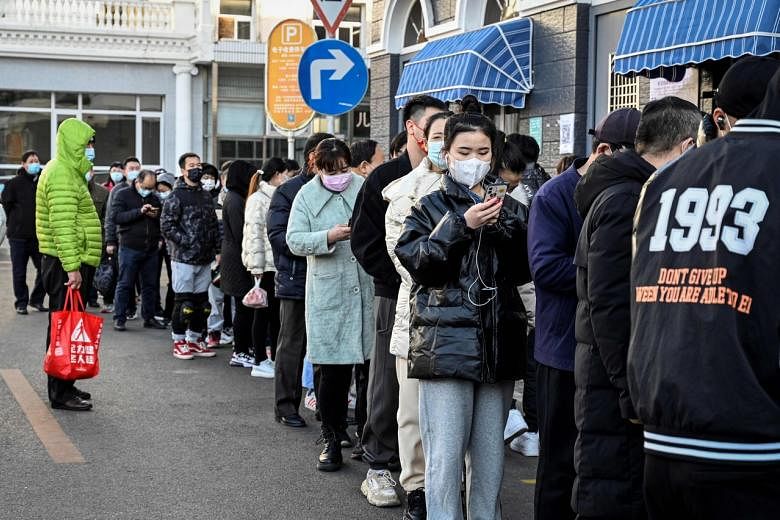BEIJING - Two weeks ago, staff working at a state-owned enterprise in Beijing received news that a person infected with Covid-19 had visited the premises, and everyone would have to be quarantined immediately.
More than 4,000 people were tested overnight while environmental samples were taken. Work came to a screeching halt, but keeping the virus at bay was the top priority.
You can imagine the chaos as people scrambled to phone their families and resigned themselves to being locked in.
A friend of mine who works there has spent the last 14 days quarantined in that office compound - sleeping first on a sofa, then a foldable camp bed before being sent to the company's on-site hotel. He will be allowed to leave on Tuesday (Nov 16).
Anywhere else in the world, these measures will seem draconian and excessive, but here in China, where people look on with horror at the high case counts overseas, this has long been the accepted order of things.
Until recently, this tough approach of tight border controls, swift lockdowns, mass testing and vaccinations has kept the country largely free from the virus.
But in the last few months, as the more contagious Delta variant began spreading around the world, China has found its zero-Covid strategy being challenged.
The current outbreak has seen domestically transmitted cases in 21 provinces, with dozens of cases reported daily. Yesterday, China logged 34 local cases.
Now Covid-19 control has morphed into a giant whack-a-mole game, as the authorities try to get ahead of a far more infectious virus - sealing off malls, office buildings and residential communities at the mere drop of a hat.
The price of living in China during the pandemic has always meant trade-offs of personal freedoms for safety.
It has been a bargain that most people accept, but this personal cost is rising as China battles more infectious variants of the virus.
Especially so in Beijing, since the Chinese capital is under pressure to be Covid-19-free as the Winter Olympics in February approaches.
Over the weekend, it announced that travellers would need a negative Covid-19 test in order to enter the city from Wednesday (Nov 17).
With China facing its worst outbreak in months, the authorities have doubled down on their no-nonsense approach.
But the result is also a palpable uncertainty - living with the constant possibility of suddenly being shut out of offices, locked at home or unable to travel.
Earlier this month, the Shanghai Disneyland theme park was suddenly shut down for two days after a woman who visited the park tested positive. About 34,000 people inside the park were stopped from leaving until they had tested negative.

Last Thursday, the Raffles City Beijing shopping mall was shut after it emerged that a close contact of a confirmed case had visited the building.
Those working in the adjoining office building - where The Straits Times' bureau is located - were made to go for Covid-19 tests.
Beijing is trying to put a positive sheen on its efforts, with the state media running stories on how deliverymen stuck in locked down residential neighbourhoods gamely donned protective gear to become epidemic control volunteers.
But in a country of 1.4 billion people, it is a sure bet that not everyone feels the same way.
Pet owners, for instance, are up in arms after accounts emerged of pets being euthanised after their owners tested positive or were quarantined.
In Ruili town, on the border between China's Yunnan province and Myanmar, residents are in despair. They have been in lockdown for more than six months this year because imported cases have repeatedly been reported.
Fatigue and frustration are building up as many Chinese see no end to this, or find themselves at the receiving end of what seem like extreme measures.
Meanwhile, disruptions from lockdowns continue to affect business and tourism in the country.
Even as the rest of the world opens up and gets used to a future living with Covid-19, the Chinese government has signalled that it would not be deviating from its present course for now.
Chinese leaders probably think that most of their people will continue to gladly trade some of their freedoms for relative safety from the virus.
But it is a choice that comes at a great cost: the longer Beijing keeps this up, the greater the personal and economic costs will be.
- Catch Danson Cheong's podcast on ST's Asian Insider Podcast Channel.












